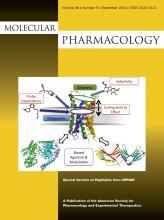Abstract
The present study was designed to investigate the effect of metformin on the impairment of intermediate-conductance and small-conductance Ca2+-activated potassium channels (IKCa and SKCa)–mediated relaxation in diabetes and the underlying mechanism. The endothelial vasodilatation function of mesenteric arteries was assessed with the use of wire myography. Expression levels of IKCa and SKCa and phosphorylated Thr172 of AMP-activated protein kinase (AMPK) were measured using Western blot technology. The channel activity was observed using a whole-cell patch voltage clamp. Reactive oxygen species (ROS) were measured using dihydroethidium and 2′,7′-dichlorofluorescein diacetate. Metformin restored the impairment of IKCa- and SKCa-mediated vasodilatation in mesenteric arteries from streptozotocin-induced type 2 diabetic rats and that from normal rats incubated with advanced glycation end products (AGEs) for 3 hours. In cultured human umbilical vein endothelial cells (HUVECs), 1 μM metformin reversed AGE-induced increase of ROS and attenuated AGE- and H2O2- induced downregulation of IKCa and SKCa after long-term incubation (>24 hours). Short-term treatment (3 hours) with 1 μM metformin reversed the decrease of IKCa and SKCa currents induced by AGE incubation for 3 hours without changing the channel expression or the AMPK activation in HUVECs. These results are the first to demonstrate that metformin restored IKCa- and SKCa-mediated vasodilatation impaired by AGEs in rat mesenteric artery, in which the upregulation of channel activity and protein expression is likely involved.
Footnotes
- Received March 24, 2014.
- Accepted August 14, 2014.
This work was supported by the National Nature Science Foundation of China [Grants 81370191, 81170137, and 81200097] and funding from Key Laboratory of Cardiovascular Medicine Research (Harbin Medical University), Ministry of Education [Grant 2013010].
↵
 This article has supplemental material available at molpharm.aspetjournals.org.
This article has supplemental material available at molpharm.aspetjournals.org.
- Copyright © 2014 by The American Society for Pharmacology and Experimental Therapeutics
MolPharm articles become freely available 12 months after publication, and remain freely available for 5 years.Non-open access articles that fall outside this five year window are available only to institutional subscribers and current ASPET members, or through the article purchase feature at the bottom of the page.
|







